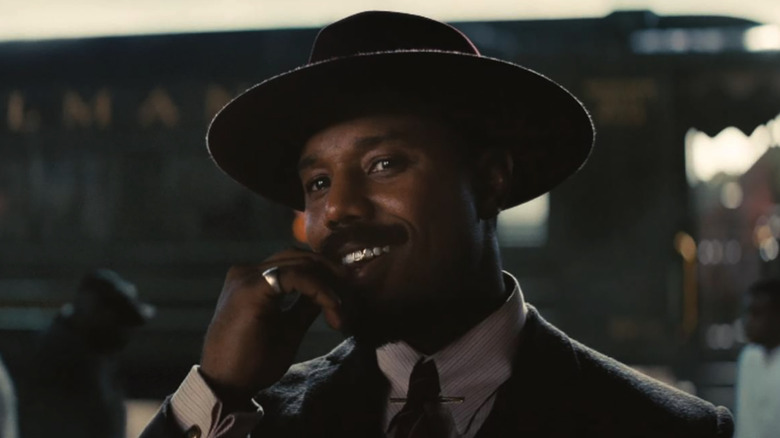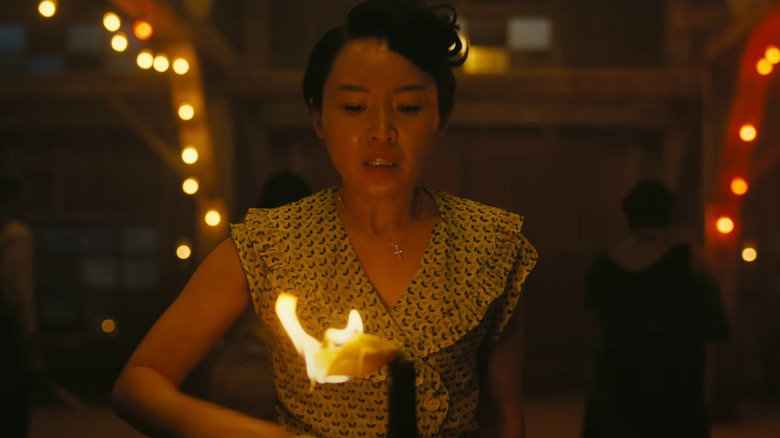The Striking Sinners Scene You Likely Didn't Know Is Based On Real Events
Ryan Coogler's new vampire musical "Sinners" is handily one of the best films of 2025. It tells the story of identical twins Elijah and Elias Moore — nicknamed Smoke and Stack, both played by Michael B. Jordan — who are endeavoring to escape the rough-and-tumble world of Chicago's criminal underground in 1932. They have returned to their hometown in Mississippi with a lot of cash and a dream of opening a successful juke joint. They know musicians and potential employees, and they know of an old barn — owned by a racist old white guy — that they can buy. As they rush around town, trying to get supplies, they each reconnect with old friends and jilted lovers. Their juke joint is a business opportunity, but also a way to re-form a scattered Black community, as well as salvage their reputation.
Also, there are vampires. A trio of white people who know Irish folk music attempt to break in while the Juke Club is in full swing. They claim they just want to play along with the talented blues musician Sammie inside (Miles Caton), but it's clear they want to drink everyone's blood and harness Sammie's musical prowess. One can see that "Sinners" is at least partly about the white co-opting of Black music; the white musicians are literally feeding on Black people.
Two of the employees that Smoke and Stack hire are Grace and Bo Chow (Yao and Li Jun Li), Chinese immigrants, who own a pair of thriving sundry shops in the middle of the Mississippi Delta. Grace is hired to paint the dance club's sign. As it happens, the shops where the Chows sell their goods are striking historically accurate, overseen by Coogler's cultural consultant, Dolly Li. Indeed, the shops were designed to look exactly like the Asian-owned shops in 1932 Mississippi, as seen in the documentary series "The Untold Story of America's Southern Chinese."
The Chow's shop in Sinners was designed after an actual Chinese-owned store in the Mississippi Delta
Dolly Li was one of the producers of the above-mentioned documentary and served as its host. Her insight was well-researched and invaluable to Ryan Coogler's film. According to an article in Vulture, Li and Coogler began communicating after he saw her documentary series and was struck by how personal it was. It seems that Coogler's father-in-law had Chinese Delta ancestors, and he knew that he needed to represent the presence of Chinese-owned businesses in his film.
In "Sinners," the Chows owned two shops that stood across the street from one another — one serving the Black community, while the other, white folks. This was based very directly on the actual Greenville, Mississippi, shops called the Min Sang & Co. Grocery, pictured in Li's film. Those shops, once located on Alexander Street, also opened in the 1930s, and provided the local Black community with about 70% of its groceries. Sadly, it looks like those stores have now closed. Li was astonished that Coogler thought to include Chinese characters in his film, saying on Twitter:
"I 100% know that Ryan could've made the store owners white or Black and nobody would've batted an eye. To insist on including them — which has resurfaced this doc & history — now that is camaraderie."
"Sinners" also featured the Chows' teenage daughter Lisa (Helena Hu) in a small role. Li's documentary talks to a woman named Jean Maskas, who recalled growing up in her parents' Mississippi grocery store, living in the back (Chinese people weren't allowed to own property back then). Lisa could very well be a stand-in for women like Maskas — or, given her age, Maskas' mother — who have clear memories of what it was like being the child of Chinese parents, serving the Black community during the segregation-era South.
These details make "Sinners" feel rich and lived-in, made by people who want to capture the Black and Chinese experiences of 1930s Mississippi. Well done, everyone.

